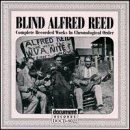| All Artists: Blind Alfred Reed Title: Complete Members Wishing: 2 Total Copies: 0 Label: Document Original Release Date: 2/24/1998 Re-Release Date: 3/2/1998 Album Type: Import, Original recording reissued Genres: Country, Blues, Folk, Pop Styles: Bluegrass, Classic Country, Traditional Folk Number of Discs: 1 SwapaCD Credits: 1 UPCs: 714298802221, 788518802223 |
Search - Blind Alfred Reed :: Complete
 | Blind Alfred Reed Complete Genres: Country, Blues, Folk, Pop
|
Larger Image |
CD Details |
CD ReviewsA interesting fiddler, interesting words, Tony Thomas | SUNNY ISLES BEACH, FL USA | 09/30/2004 (5 out of 5 stars) "I bought this record because Alfred Reed is one of the rare fiddlers who sings and plays along with his singing. I've been trying to do that, and one of the great fiddle experts on the planet, as well as a great old time singer both recommended I get into Alfred Reed. Glad I did!
Most of the few fiddlers who sing either stop playing while they sing, or play harmonies with their songs while singing. Reed barrels ahead, playing the same leads and fills required if he wasn't singing. He must have been something to see! If you are like me, you might have spent the last 40 years, identifying Alfred Reed's fiddling with the fiddling Mike Seeger does on the many Alfred Reed tunes that the New Lost City Ramblers recorded in the 1950s and 1960s. To be sure in 40 years, even Mike's fiddling has improved, although he plays a lot more banjo than fiddle these days. Reed's fiddling is better. Well Alfred Reed was no slouch as a fiddler. His fiddling was even had just a touch of the kind of swing that Posey Rorer used with Charlie Poole. Today's old time music scene tends to be dominated by people whose ultimate aim is to make it in the contra dance industry. They tend to know a lot of fiddle and banjo dance tunes, but not too many of the songs, topical and otherwise which were a key part of the old time repertoire. As a singer of songs, I have always been looking for music like Reed's or Charlie Poole's. Of course they came from quite different directions. Reed was a teetotalling narrow Christian moralist. Poole was a legendary rounder who allegedly drank himself to death in a three day drinking spree celebrating after a Hollywood Studio asked him to bring his band to tinseltown to play in the movies. Both contributed topical songs of the day that say something about life. Unlike Poole who mainly recycled traditional music, pop, ragtime, and blues tunes of the day, Reed wrote all of his own material. Reed's songs are the cries of the Appalachian world as modernization came up the creeks and hollows in the 1910s and 1920s with the depression following it in the 1930s. Some of them are pretty bad in their conservative anti-womanism: "Why do you Bob your hair girls, your hair belongs to men" was Reeds biggest hit, a tune he actually recorded twice! The best of them speak up againt the opprssions as in his "They'll be no distinction there," and his immortal depression song, "How can a poor man stand such times and live," which has been covered by Ry Coorder among others. This is pretty interesting. The guitar playing is simply but instructive. Too many people have replaced the actual old time guitar accompaniment with 1950 & 60s hot guitar playing ALA Doc Watson. Try spending a few hours with a guitar and Reed's fiddling and singing to learn to do it right. If you want some interesting old time music, or dialogue with a lost world, this CD is for you! " |

 Track Listings (20) - Disc #1
Track Listings (20) - Disc #1